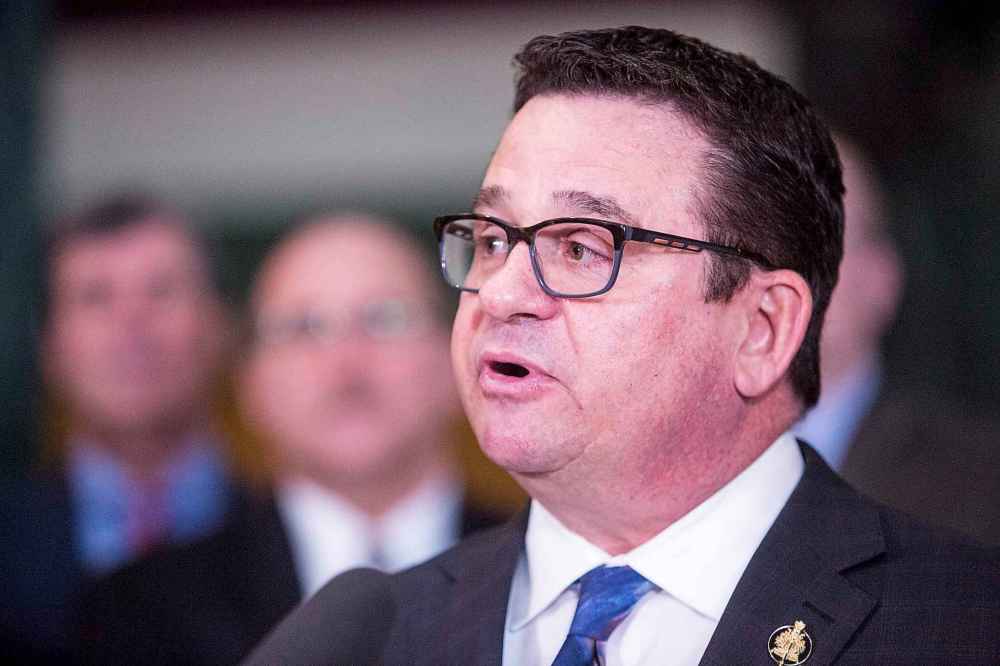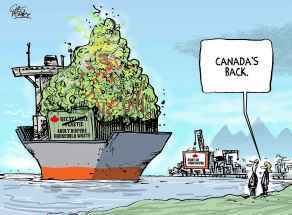Province would control land use in city under proposed municipal-development changes
Read this article for free:
or
Already have an account? Log in here »
To continue reading, please subscribe:
Monthly Digital Subscription
$0 for the first 4 weeks*
- Enjoy unlimited reading on winnipegfreepress.com
- Read the E-Edition, our digital replica newspaper
- Access News Break, our award-winning app
- Play interactive puzzles
*No charge for 4 weeks then price increases to the regular rate of $19.00 plus GST every four weeks. Offer available to new and qualified returning subscribers only. Cancel any time.
Monthly Digital Subscription
$4.75/week*
- Enjoy unlimited reading on winnipegfreepress.com
- Read the E-Edition, our digital replica newspaper
- Access News Break, our award-winning app
- Play interactive puzzles
*Billed as $19 plus GST every four weeks. Cancel any time.
To continue reading, please subscribe:
Add Free Press access to your Brandon Sun subscription for only an additional
$1 for the first 4 weeks*
*Your next subscription payment will increase by $1.00 and you will be charged $16.99 plus GST for four weeks. After four weeks, your payment will increase to $23.99 plus GST every four weeks.
Read unlimited articles for free today:
or
Already have an account? Log in here »
Hey there, time traveller!
This article was published 11/06/2019 (2373 days ago), so information in it may no longer be current.
The Manitoba government has released a list of recommendations aimed at overhauling planning, zoning and permitting in the province that — if implemented in its entirety — could undermine Winnipeg’s ability to make land-use decisions within city limits.
The 12 recommendations were released Tuesday on the eve of an expected pre-election media blackout and two weeks after the province dropped the results of its review into how municipalities handle development.
The proposal that has raised the most eyebrows is the creation of a “new quasi-judicial tribunal” to hear a “wide range of planning, zoning and permitting appeals across the entire province.”
While the exact scope and duties of the proposed-tribunal remains unclear, Loren Remillard, the president and chief executive officer of the Winnipeg Chamber of Commerce, said the recommendation is concerning and in need of clarification.

“We’re not overly receptive to the idea of a provincial body dictating land use for the City of Winnipeg. We’d rather see the province respect the independence of the city. It could definitely be problematic,” he said.
Review highlights
1. Accelerate the pace at which the Winnipeg Metropolitan Region is moving to adopt a co-ordinated approach to development. Establish a working group that includes representatives from the municipalities, metropolitan region, province and the private sector.
1. Accelerate the pace at which the Winnipeg Metropolitan Region is moving to adopt a co-ordinated approach to development. Establish a working group that includes representatives from the municipalities, metropolitan region, province and the private sector.
2. Create a new quasi-judicial tribunal, or broaden and enhance the mandate of the existing municipal board, to allow it to hear a wide range of planning, zoning and permitting appeals across the entire province.
3. Enact legislation that establishes “service standards” (including specified and enforceable timelines) for all levels of permitting and zoning applications across the province.
4. Make inspections more consistent across the entire province and facilitate the creation of a publicly available “grey book.”
5. Enhance self-regulatory frameworks for engineers and architects.
6. Adopt the latest version of the national building code and materially reduce the number of Manitoba amendments.
7. Provide necessary interim support to developers and potential developers during the transition period.
8. Assist Manitoba Hydro to be more aligned with provincial economic development initiatives.
9. Clarify the future role of the Office of the Fire Commissioner.
10. That the Manitoba government address the backlog of elevator and boiler permit applications and inspections and to ensure timely permitting on a go-forward basis.
11. Review the PUB model to ensure that the regulation of utilities, including Manitoba Hydro and Winnipeg Water & Waste, are aligned with provincial economic development objectives.
12. The province should work collaboratively with the City of Winnipeg to achieve rapid progress on specific, known projects of shared interest.
– Province of Manitoba
“The City of Winnipeg should have final authority over development within its jurisdiction. That’s the concern. Ontario used to have a model similar to what this recommendation is advocating and the experience was not positive.”
The province also floated the idea of enhancing the “mandate of the existing municipal board,” to achieve the same goals if, in the end, a tribunal is not created.

Remillard said other recommendations, including the implementation of the 2015 national building code and legislation enacting service standards for permitting and zoning, are positive steps that could be put into effect relatively quickly.
Mayor Brian Bowman was tight-lipped when asked about the recommendations Tuesday.
Bowman said his office was not given an advance copy of the recommendations and had little time to review them before speaking with reporters since he was tied up in an executive policy committee meeting most of the day.
“They indicated that they are going to take a more collaborative approach going forward and that’s something we welcome. If there’s a change of course in that regard, it’s something we should be applauding,” Bowman said.

However, he declined comment when asked about two specific recommendations that would affect business as usual at city hall — the creation of the quasi-judicial body and subjecting Winnipeg’s water and sewer rate increases to review and approval by the Public Utilities Board.
Municipal Relations Minister Jeff Wharton was unavailable for an interview Tuesday. In a short written statement, he said he would need additional time to review the recommendations issued by the Treasury Board Secretariat.
Meanwhile, NDP Leader Wab Kinew expressed skepticism about the government’s plan, which he characterized as a heavy-handed and top-down approach rather than a collaborative one.
“It seems like this is the premier trying to create an avenue to interfere with the city…. Some people feel like there’s maybe too much bureaucracy, but now the province is saying the answer to that is another layer of bureaucracy. To me, it doesn’t add up,” Kinew said.
“Will creating this new board help my buddy get… a permit to fix his fence? I don’t think so. It’s just playing politics. It’s the premier picking another fight with the mayor.”

The recommendations come in the wake of a 200-page report released May 28 that claimed the city has a “broken culture” that leads to losses in development opportunities and “significant anger and frustration” among users.
The report highlighted years of regulatory delays and alleged mistreatment of business applications, but relied heavily on unsubstantiated anecdotal evidence.
While Remillard said the recommendations are a bit hit-and-miss from his perspective, he applauds the province for acknowledging the importance of collaborating with the city on development.
“Like any government report, there are elements that we like and others that give us reason to pause and a desire to better understand what the implications of some of the recommendations would be,” Remillard said.
“But we’re pleased this report has drawn light to development issues and ways we could do better. We hope some greater regional collaboration can come out of this and that it can be done with an eye to how we can make sure it’s something all municipalities buy into.”
— With files from Aldo Santin and Larry Kusch
ryan.thorpe@freepress.mb.ca
Twitter: @rk_thorpe

Ryan Thorpe likes the pace of daily news, the feeling of a broadsheet in his hands and the stress of never-ending deadlines hanging over his head.
Our newsroom depends on a growing audience of readers to power our journalism. If you are not a paid reader, please consider becoming a subscriber.
Our newsroom depends on its audience of readers to power our journalism. Thank you for your support.
History
Updated on Tuesday, June 11, 2019 6:43 PM CDT: Adds thumbnail.















